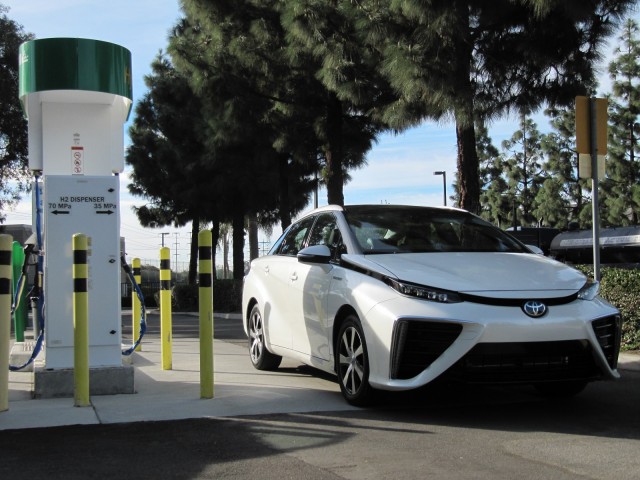Since launching in Japan in 1997, the Toyota Prius hybrid has imbued its maker with a strong green image.
The Prius has become Toyota's signature model, and helped the company become by far the world's largest seller of green cars.
But after nearly two decades on sale , hybrid powertrains no longer have the novelty they once did.
, hybrid powertrains no longer have the novelty they once did.
It appears that Toyota feels electric-car maker Tesla has stolen its thunder, but hopes that the Mirai hydrogen fuel-cell car will reclaim its image as a leader in both green cars and technology .
.
A hydrogen fuel-cell car can accomplish that because it offers a more familiar experience for consumers, Toyota North America CEO Jim Lentz said in an interview with Forbes.
“Consumers, while I think they love the idea of a high-tech car that’s very green, they still want a car that acts like what they are driving today," Lentz said.
![2016 Toyota Mirai - Quick Drive - Portland, July 2015 [photo: Doug Berger] 2016 Toyota Mirai - Quick Drive - Portland, July 2015 [photo: Doug Berger]](http://images.hgmsites.net/med/2016-toyota-mirai_100521489_m.jpg)
2016 Toyota Mirai - Quick Drive - Portland, July 2015 [photo: Doug Berger]
Hydrogen fuel-cell cars can refuel in around five minutes from a pump that's at least somewhat similar to the ones used for gasoline; Toyota is betting this will ultimately win over consumers.
Right now, though, those consumers seem more excited about Tesla's electric cars.
That may be at least partially due to design differences. Despite its radical styling, the Mirai is more or less a regular mid-size sedan.
In contrast, the Tesla Model S and Model X aim to be more desirable, with an emphasis on performance and novel tech features like a massive dashboard touchscreen.
While its $57,500 base price is also lower than that of the base Tesla Model S, at $72,000, the Mirai is also harder to find.
Sales are currently limited to certain regions of California, and Toyota only plans on selling 3,000 copies by the end of 2017.
![Tesla Supercharger stations at Harris Ranch, California, in April 2013 [photo: TeslaTap.com] Tesla Supercharger stations at Harris Ranch, California, in April 2013 [photo: TeslaTap.com]](http://images.hgmsites.net/med/tesla-supercharger-stations-at-harris-ranch-california-in-april-2013-photo-teslatap-com_100494759_m.jpg)
Tesla Supercharger stations at Harris Ranch, California, in April 2013 [photo: TeslaTap.com]
At the moment, the Mirai is also hampered by lack of fueling infrastructure, since owners can't take advantage of their homes' electrical service to "refuel."
Toyota sells the hydrogen car through eight dealerships in California, but creating an adequate network of fueling stations for that small market has proven challenging.
There are presently just 16 retail hydrogen fueling stations in the U.S., with about 30 expected to be open by the end of the year, according to HybridCars.
Tesla has a fast-growing network of "Supercharger" DC fast-charging stations along major highways, as well as 240-volt Level 2 AC stations it calls "destination chargers."

2016 Toyota Mirai hydrogen fuel-cell car, Newport Beach, CA, Nov 2014
Toyota has not so far committed to building a national hydrogen-fueling infrastructure in support of the Mirai.
Even if it did, installing stations at $1.5 million to $2 million apiece is much more expensive than installing DC fast-charging stations for battery-electric cars.
Despite the lower costs involved, however, General Motors has said it won't build the DC fast-charging equivalent of Tesla's Supercharger network for its upcoming 2017 Chevrolet Bolt EV electric car.
![2016 Toyota Mirai - Quick Drive - Portland, July 2015 [photo: Doug Berger] 2016 Toyota Mirai - Quick Drive - Portland, July 2015 [photo: Doug Berger]](http://images.hgmsites.net/med/2016-toyota-mirai_100521498_m.jpg)



No comments:
Post a Comment